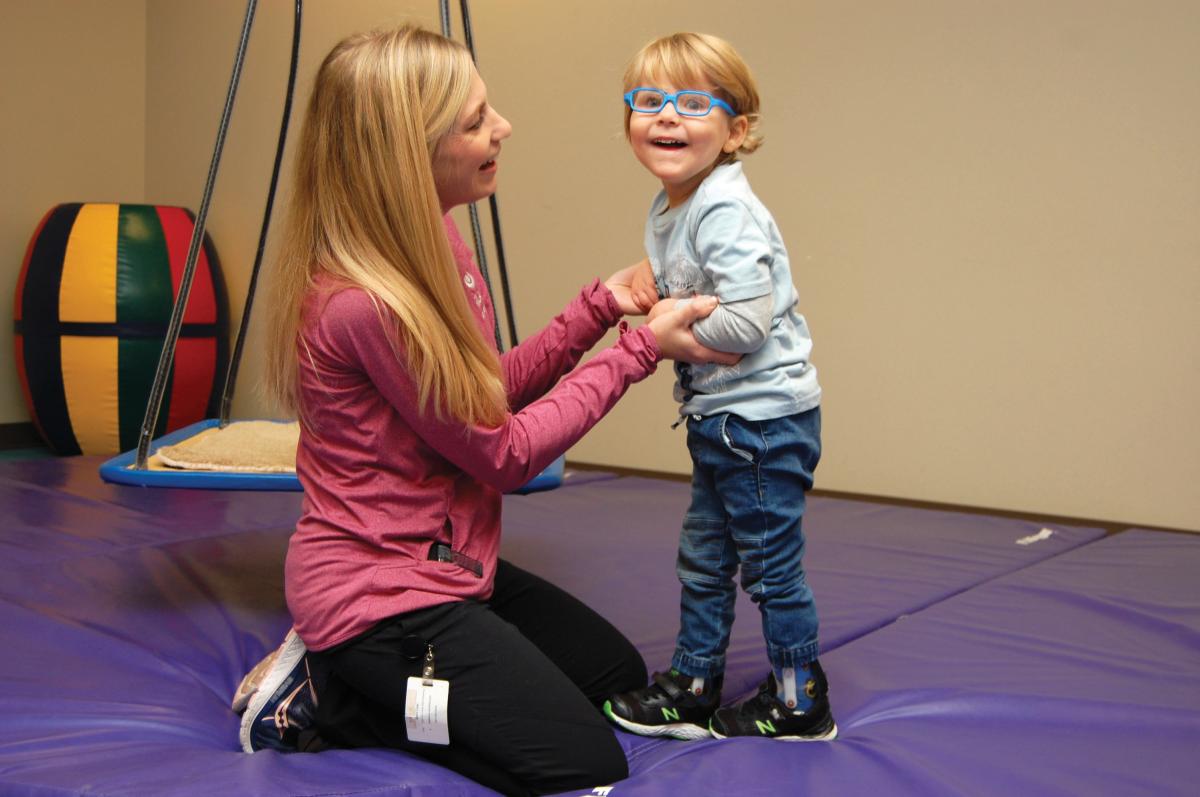Last week, the Iowa Pediatric Healthcare Collaborative, a group comprised of Blank Children's Hospital, ChildServe, MercyOne Children's Hospital and University of Iowa Stead Family Children's Hospital, hosted one-on-one discussions with Iowa families and federal lawmakers. Coinciding with the Children's Hospital Association's 2022 Speak Now for Kids Family Advocacy Week, June 12 to 14, patient families across the country met with federal representatives. The group discussed the unique role of children's hospitals in providing care and critical investments needed for children's healthcare in the months and years ahead.
"As Iowa's leaders in providing high-quality healthcare services to children with complex and special healthcare needs, the collaborative works to identify and address issues affecting children's healthcare in Iowa," said Teri Wahlig, M.D., Iowa Pediatric Healthcare Collaborative Chair and ChildServe CEO. "It was our privilege to work with families and lawmakers to increase awareness and advance public policy priorities to address timely access to medical providers; the mental and behavioral health needs of children and teens; and the vital role of Medicaid."
Together, Iowa's pediatric healthcare providers share a collective voice to better educate and inform local, state and federal policymakers about existing and emerging issues impacting the health of Iowa's children. This month, the group facilitated discussions with Congresswoman Cindy Axne, Senator Joni Ernst, Congressman Randy Feenstra, Senator Chuck Grassley and Congresswoman Mariannette Miller-Meeks to discuss the importance of telehealth, mental health services and Medicaid for children with complex medical conditions.
Charlie Curtis
Charlie was born at Highland Park Hospital in Chicago in August 2012. At just six days-old, during his first pediatric check-up, doctors discovered he was hypothermic. He was sent to the ER where a spinal tap revealed he had sepsis and suspected bacterial meningitis. He spent the next 30 days in the hospital. That was the beginning of the family's journey down a long path of unanswered questions that continues to this day.
Charlie recovered from that initial setback. With his pediatrician's support, the family created a plan to monitor Charlie's health and weight. However, additional hospitalizations followed - both the result of common viruses. Growth and development were difficult for Charlie, he was diagnosed with failure to thrive, hypotonia and oral motor dysphasia, a pediatric feeding and swallowing disorder all by 9-months old. Charlie was later diagnosed in 2017 with microcephaly, a condition where a child's head is smaller than expected, and a variant of uncertain significance, a relatively unknown genetic condition, on his SYNE 1 gene - a genetic condition that impacts every facet of his life. The SYNE 1 gene tells the brain to make the protein muscles need to coordinate body movements.
Charlie's mom, Nancy, has been an instrumental advocate for him, and knowing the importance of early intervention, worked with providers to provide physical, aquatic, occupational, developmental, feeding and speech therapy. He was seen by a gastroenterologist, ophthalmologist, neurologist, physiatrist, geneticist, and developmental pediatrician.
Charlie and his family moved to Iowa in 2018, where Nancy worked to rebuild the expansive medical model they had established in Chicago. Fast forward to today, and she has done just that. Currently, Charlie receives services from the majority of Iowa's major medical providers. His physiatrist, therapies, orthotist and durable medical equipment services all take place through ChildServe. The family utilizes pediatric neurology through the University of Iowa and gastroenterology and nutrition services through MercyOne. Charlie's developmental pediatrician and geneticist is from the Blank Star Developmental Center.
"While this may seem like a widespread web of services, this model is very tight," Nancy said. "Many families travel out of state in order to receive comprehensive medical services for their children due to lack of pediatric specialists in Iowa. We are fortunate to receive Charlie's medical care locally, but it comes with significant wait times for appointments with specialists and an ever increasingly complex privatized managed care system."
Today Charlie is a happy 6-and-a-half-year-old. He has gone from the 10th to 50th percentile for weight, is on the cusp of independent ambulation and enjoys riding his adaptive bike. He is nonverbal, but uses eye gaze, gestures, word approximations, signs and a communication device to express himself.
With support from ChildServe, where Charlie receives specialty healthcare services, and the Iowa Pediatric Healthcare Collaborative, comprised of Blank Children's Hospital, ChildServe, MercyOne Children's Hospital and the University of Iowa Stead Family Children's Hospital, Charlie is making strides that enable him to reach his full potential.
Legislative Discussions
In discussions with legislators, families discussed the importance of the continuation of telehealth services following the COVID-19 pandemic, the challenges that have further complicated mental health services, and Medicaid for children with complex medical conditions.
Nationwide, approximately 37 million children rely on Medicaid for health care coverage. Many families, like the Curtis family, have private, employer-based medical insurance - but they often need Medicaid as a secondary insurance. Often, working parents rely on expanded, more inclusive medical coverage provided through Medicaid for children with special healthcare needs.
In addition, children's hospitals are asking Congress to increase funding to providers of mental health services so they can expand capacity and treat more kids in need. This can be accomplished by improving access to mental health services through Medicaid, by directing funding for behavioral health programs to specifically target kids' needs, and by expanding the pediatric workforce and infrastructure to ensure children get the right care, in the right place and at the right time.
"The Iowa Pediatric Healthcare Collaborative is honored to work with the Curtis family, who represent families from across the nation, to elevate patient stories and educate lawmakers about the essential role of children's hospitals and facilities," Dr. Wahlig said. "Together, we can make children's health a national priority through policies that transform lives through pediatric healthcare."

Comments
Submit a CommentPlease refresh the page to leave Comment.
Still seeing this message? Press Ctrl + F5 to do a "Hard Refresh".